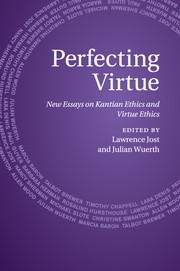Book contents
- Frontmatter
- Contents
- Notes on contributors
- Acknowledgements
- List of abbreviations
- Introduction
- 1 Virtue ethics in relation to Kantian ethics: an opinionated overview and commentary
- 2 What does the Aristotelian phronimos know?
- 3 Kant and agent-oriented ethics
- 4 The difference that ends make
- 5 Two pictures of practical thinking
- 6 Moving beyond Kant's account of agency in the Grounding
- 7 A Kantian conception of human flourishing
- 8 Kantian perfectionism
- 9 Aristotle, the Stoics, and Kant on anger
- 10 Kant's impartial virtues of love
- 11 The problem we all have with deontology
- 12 Intuition, system, and the “paradox” of deontology
- Bibliography
- Index
4 - The difference that ends make
Published online by Cambridge University Press: 04 February 2011
- Frontmatter
- Contents
- Notes on contributors
- Acknowledgements
- List of abbreviations
- Introduction
- 1 Virtue ethics in relation to Kantian ethics: an opinionated overview and commentary
- 2 What does the Aristotelian phronimos know?
- 3 Kant and agent-oriented ethics
- 4 The difference that ends make
- 5 Two pictures of practical thinking
- 6 Moving beyond Kant's account of agency in the Grounding
- 7 A Kantian conception of human flourishing
- 8 Kantian perfectionism
- 9 Aristotle, the Stoics, and Kant on anger
- 10 Kant's impartial virtues of love
- 11 The problem we all have with deontology
- 12 Intuition, system, and the “paradox” of deontology
- Bibliography
- Index
Summary
The starting point for many discussions of Kantian ethics and virtue involves either a presumption or a challenge to the effect that an account of the virtues, or an ethics of virtue, is both essential to a proper understanding of morality and alien to the Kantian enterprise. I think we should be puzzled about how that idea gets going.
After all, Kant has a “Doctrine of Virtue”; there are clear virtues that a Kantian moral agent should have; there is a nuanced and insightful, if not fully formed, story about how moral competence is acquired that is, partly, about the development of elements of a moral character necessary for good action. While it was for a long time thought that Kantian morals were legalistic, a matter of fixed and rigid rules of duty, requiring no more of the agent than conformity, that is no longer the prevailing view. There are duties and obligations, perfect and imperfect, but they do not subtend actions automatically: they depend on deliberation and situation-sensitive judgment. Where there are rules of action it is because there are regions of moral or social life where having rules is essential to successful human activity – what counts as property and wrongful taking, for example. For the same reason Aristotle also regards the virtue of justice as rule-normed. But perhaps nowadays we do not think justice is paradigmatically a virtue.
- Type
- Chapter
- Information
- Perfecting VirtueNew Essays on Kantian Ethics and Virtue Ethics, pp. 92 - 115Publisher: Cambridge University PressPrint publication year: 2011
- 3
- Cited by

